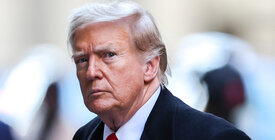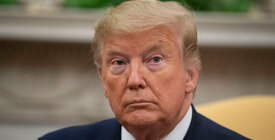This was originally published by Newsweek.
“If [the president] commits any crime, he is punishable by the laws of his country.”
In 1788, James Iredell, who later became a U.S. Supreme Court justice, urged his fellow delegates in North Carolina to ratify the U.S. Constitution. He assured them that the country’s top executive could be held criminally accountable for his actions. In other words, the new president would not become a king. The principle of accountability was a major selling point for the new representative government, one echoed by many advocates for ratification like James Wilson and Tench Coxe.
These historical conversations are inconvenient for former President Donald Trump as he attempts to get off the hook for trying to overturn the 2020 election. He is trying to persuade the Supreme Court that the Founders wanted to empower presidents with king-like immunities from prosecution, that the privileges of a “chief executive” from before the American Revolution—those of a king—transferred to the president afterwards, and that they belong permanently to whoever holds that office.
History is messy, and political debates over fundamental principles have often been fierce. Many constitutional questions are therefore open to interpretation. On this issue, however, there was no debate. The principle that a president could be prosecuted was one agreed upon by all sides since the literal beginning of the nation. It has extended continuously into the present day. It’s why President Gerald Ford pardoned President Richard Nixon in 1974 and why President Bill Clinton accepted a plea bargain in 2001. It’s one of several ideas—like the rule of law, the importance of accountability, the power of the vote, and the peaceful transfer of power—that are integral parts of our national history and national identity.
Trump’s immunity claim would negate all of them. Indeed, his claim isn’t just attempting to rewrite 18th-century history. It’s attempting to rewrite the history of American democracy. Our democracy.
Along with many colleagues, we just filed an amicus brief with the Supreme Court to show that Trump’s claim is not historically credible. A response from historians is important because of the way Trump is making his case to the court. A supermajority of justices endorse “originalism”—the idea that the Constitution only means whatever the earliest generations of Americans thought it meant several hundred years ago. Trump is offering up a false version of American history comprised of cherry-picked quotes and misrepresented sources.
We counter Trump’s false narrative with historical facts. But Trump shouldn’t lose (just) because his 18th-century history is wrong. Nor should he lose just because his arguments turn the president into a figure with disproportionate powers compared to the rest of the government. He should lose because his claims strike at principles that have been critical to our system of government for centuries.
Our country was born from the idea that our leaders should be accountable to the people. As Thomas Paine stated in his pamphlet Common Sense, which stoked the fire for the American Revolution: “[I]n America the law is king.” In other words: No one is above the law. Not even kings.
And certainly not our presidents.
The Framers carefully designed the Constitution to ensure that the president wouldn’t be an elected king. Debates raged then—as they do now—over the exact content and scope of the president’s powers. But they agreed that presidents should be held to account for violating the law. To empower presidents to act with impunity would create a monarchy. Our democracy emerged from conventions that ratified that understanding. In the past half century, presidents Nixon, Ford, and Clinton affirmed it with their decision-making around pardons and pleas.
Our democracy has been sustained by the idea that the people choose their presidents and that incumbent presidents hand over power peacefully when their time in office has ended. This has always been more than an ideal. It describes the way every election has worked … until 2020. Critically, Trump did not succeed in overturning the 2020 election. But he shattered the norm by allegedly committing the crimes with which he has been charged—including lining up slates of false electors and trying to pressure Vice President Mike Pence into rejecting valid electors for Joe Biden.
Failing to respect the election of a new president is the ultimate crime against democracy, because it short-circuits the main way we have always ensured that presidents don’t rule over us like kings: voting them out. When the Founding Generation deliberated over whether to ratify the Constitution, advocates like Iredell emphasized that the people held the power to remove presidents from office. In America, people would have the vote and their votes would matter. We have lived by that promise ever since. Trump’s coup plot tried to break it.
From the beginning, Americans have affirmed that presidents are not kings and presidents can be prosecuted. They have also affirmed that we’re a nation of laws, and we’re a democracy based on the vote. In trying to manipulate history into giving him a pass for his potentially democracy-ending crime, Trump is trying to change what American democracy means.
Trump wants you to think this case is all about him—how, in the annals of American history, he has been uniquely persecuted.
But it’s never been about him. It’s always been about all of us and about the future of our democracy—whether we’ll continue to have a government based on the consent of the governed. We’re supposed to have a system where—to paraphrase early federal court judge St. George Tucker—everyone can be held accountable, from the president of the United States to “the beggar in the streets.” What the court decides will determine whether such a “nation, so conceived and so dedicated, can long endure” after it has endured for so long.





